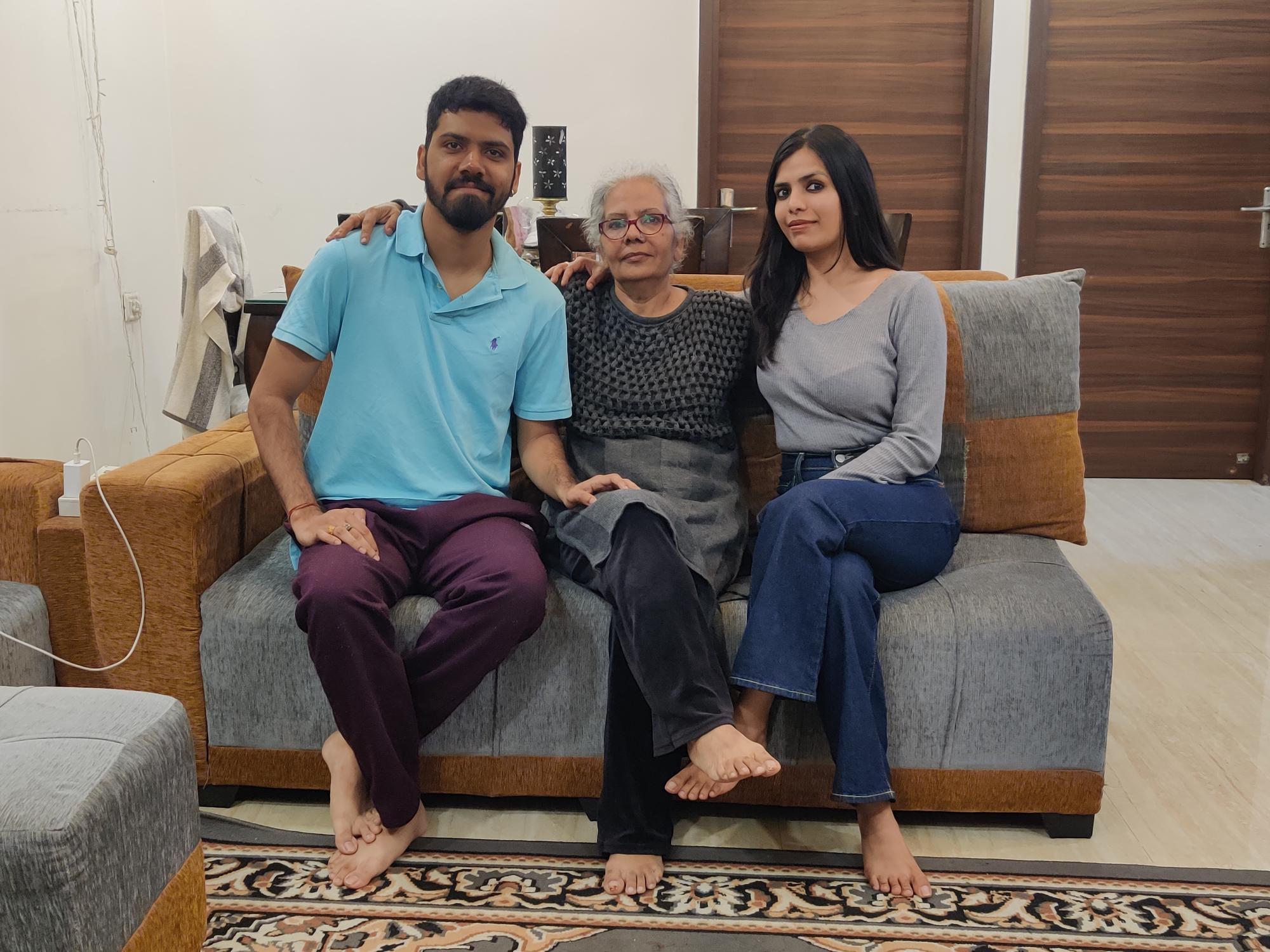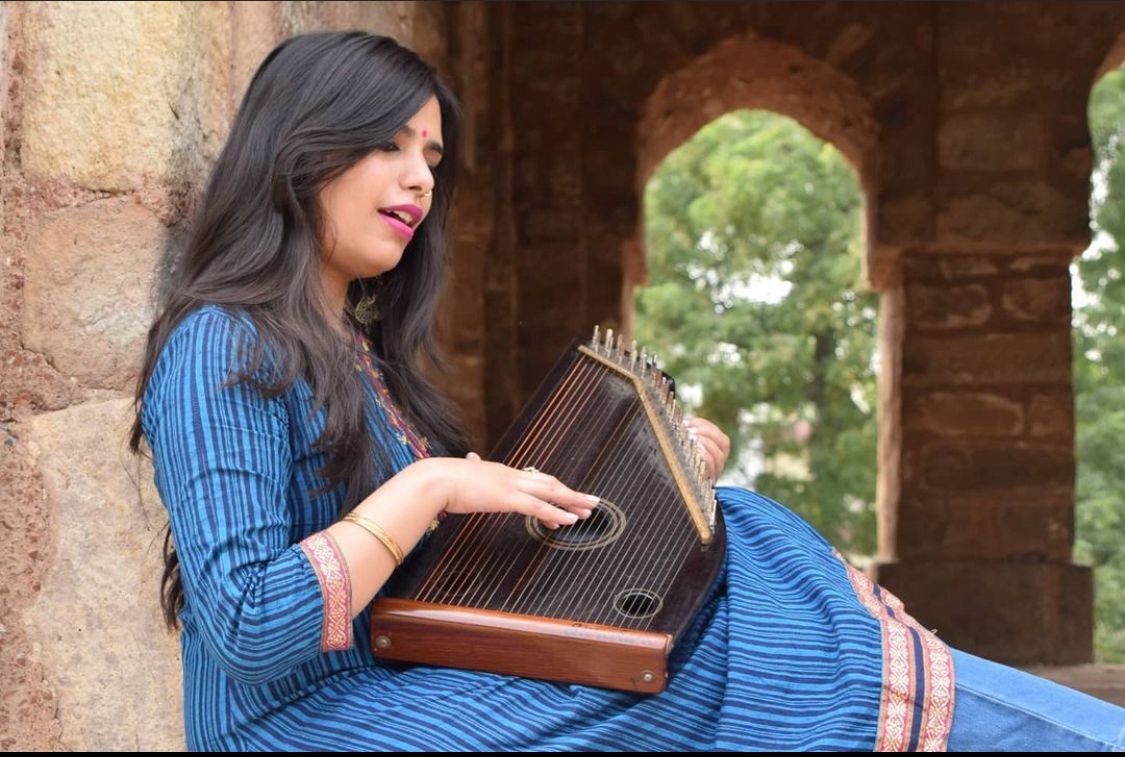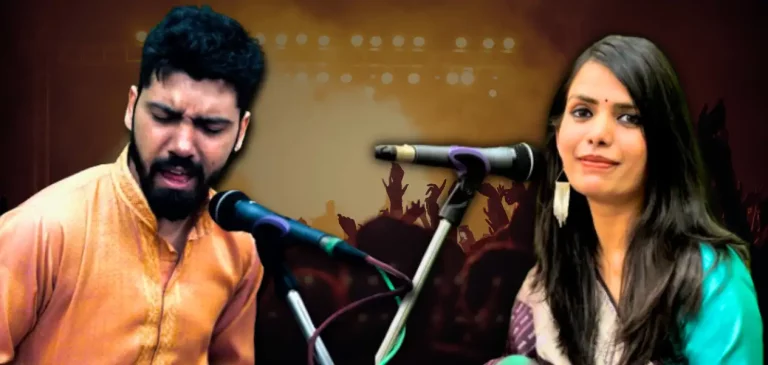Tripti Nath/New Delhi
The home of Hindustani classical vocalist Ghulam Hasan Khan in South Delhi offers a unique example of interfaith unity and talent. This is a family of three musicians – each professing a different religion, living together in harmony, welcoming the first ray of sunshine into their daily practice.
Members of this family celebrate all major festivals including Holi, Diwali, Eid and Christmas with the same zeal and enthusiasm. Ghulam Hassan's mother, Roma Abbas Khan, is a Christian and also a ghazal singer, and his wife, Shivani Singh, is a famous ghazal singer and also enrolled for a Ph.D. At Delhi University. It was the love of music that brought them together in 2016 and united them in marriage three years later.
– Awaz-The Voice (@AwazThevoice) March 6, 2024
They both met while studying at Delhi University's College of Music. Ghulam smiles and remembers how he fell in love with her voice and beauty and proposed to her at the metro station. He still has initial messages sent to Shivani on his mobile phone.
While Roma learned music in the early 1980s from Ustad Hafeez Ahmad Khan of Rampur Sahaswan Gharana, Shivani learned music from Pandit Bhola Nath Mishra of Banaras Gharana.
 Ghulam Hassan Khan with his mother and wife
Ghulam Hassan Khan with his mother and wife
One of the legends of the 200-year-old Khayal Jayaki of Rampur Sahaswan Gharana who follows in the tradition of legendary musician Mian Tansen, Ghulam Hassan Khan, 29, has a rich and enviable family lineage in music. His paternal grandmother's father, Ustad Mushtaq Hussain Khan, was the first singer of Hindustani classical music to be selected for the Padma Bhushan. Ghulam also delivers thumri, tarana, ghazal, jeet, sufi and bhajan with equal ease.
His paternal grandfather, Ustad Ghulam Jafar Khan, was the Sarangi Nawaz (player) of the Rampur Durbar.
Ghulam says there are two musical lineages in his family. Elaborating on his rich heritage, he said, “I am a descendant of Ustad Mushtaq Hussain Khan. Ustad Inayat Hussain Khan Sahab started the Rampur Sahaswan Gharana and was learning from Ustad Bahadur Hussain Khan Sahab who was a court musician in Gwalior and a Gwalior Gharana as well. Therefore, Rampur came into being.” Sahaswan Gharana of Gwalior Gharana, Ustad Inayat Hussain Khan Sahab had two disciples – his son Ustad Fida Hussain Khan Sahab along with Mushtaq Hussain Khan Sahab and Haider Khan Sahab.
“Ustad Fida Hussain Khan Sahab is the father of Nisar Hussain Khan Sahab. Ustad Inayat Hussain Khan Sahab asked Mushtaq Hussain Khan Sahab to succeed him and my grandfather learned from him. What is interesting is that my mother learned music in Delhi from Ustad Hafiz “Ahmed Khan is a cousin My paternal grandfather and a student of Ustad Nisar Hussain Khan. I have been fortunate to benefit from the tradition of Ustad Mushtaq Hussain Khan as well as Ustad Nisar Hussain Khan.”
Music has been an integral part of Ghulam's life since childhood. He remembers that while he was leaving the house to go to school, he used to hear the voice of his grandfather and the drum and electronic tanboura. “I was very fortunate that it was my father, Ustad Ghulam Abbas Khan, a world-renowned singer, who introduced me to music when I was four years old. I started learning from my paternal grandfather, Ustad Ghulam Sadiq Khan, who was awarded the Padma Shri and had “With very strict standards. He was very strict. I remember that one time while I was riding my bike in our neighborhood in the Asyad Games Village, my mother picked me up and carried me to my grandfather's room to go to the kindergarten. Classical music is like a system.”
Even when he was a child, Gholam's grandfather made him train six hours a day. After all, he was one of the best Hindustani classical singers in India. “I learned very early that Indian classical music is a beautiful art and can only be learned with discipline. My grandfather's room was not just a room. It was like our neighbourhood. Even today, I practice music for at least four and a half hours every day.” day.''
Ghulam remembers that when his grandfather’s health did not allow him to teach his students, he would call him to take his place. Ghulam has so far taught at least 350 students. His students come to his house almost every day to learn, and he also teaches music online to students in the US and UK
Ghulam Hassan Khan and Shivani pose in front of the Padma Shri quote
He vividly remembers the day his grandfather introduced him at a concert organized by one of his students at the Burvi Foundation Music Festival. It was 2006. Ghulam Hassan Khan was just ten years old and was singing Raaj Hameer. How his grandfather chose the right time to perform on stage is also an interesting story. His student came to ask him to sing at the party but he suggested that Ghulam sing. “Mai chahta hun ki mai apnepote ka Bismillah kara dun'' (I want to offer it) – my grandfather said to his student.
Ghulam was not confident and refused in front of his grandfather's student. He told his grandfather that he was not ready, but he was very convincing. “He first asked me to apologize to his student for refusing to sing and assured me that he would teach me for the concert. My grandfather had a way of rewarding me when he felt I sang well. I miss those times very much. I went ahead and performed with Ustad Mahmud Dholpuri who was Padma Shri for harmonium. He also played “Tabla maestro Pandit Subhash Nirwan is at this concert. Unfortunately, they are no longer there.”
After 2006, Ghulam gave at least 250 concerts in India and abroad. “I also started a band from 2012 to 2015, but my grandfather was not happy with it. He knew I was meant for Hindustani classical music and not a band. He told me that after he is gone, no one will teach me. I realize it now and I regret it. My father knew that there was a lot of financial struggle in Indian classical music and he wanted me to earn some money for financial stability. “
When Ghulam sang Bandesh in Raaj Hameer, I was blown away. His voice sounded like that of an experienced musician, not that of a young musician, but what saddens Ghulam is that it is difficult for Indian classical musicians to continue with their passion because they do not get the pay they deserve. He says his private lessons are what keeps him going.
He also regrets that some organizers ask them to finish the concert in 45 minutes. “I believe an Indian classical singer can do justice to a concert that is at least two-and-a-half hours long. In 2022, I was invited by a family of music lovers to attend a family wedding. The concert lasted three-and-a-half hours. “I enjoyed singing many ragas. It was very satisfying. Maybe God has given me the responsibility to continue this musical tradition. It helps me maintain my gharana tradition, takes care of my bread and butter, and also gives me inner satisfaction.
“I consider myself very lucky to have been born into such an illustrious family, but I often hear my students complain that their parents want to invest in their music tuition just for the sake of making returns. The reality is different. In Indian classical music, you get izzat (respect ) and you are invited but people are not willing to pay more than Rs 10,000 or Rs 12,000 for a concert. All we earn is from tuition fees but in a complete calendar year, the maximum I can earn is Rs 50,000 from concerts.” In Indian Classical Music , the organizers only promote those who are in the spotlight. Everything is dictated by lobbyists, not merit. There is a lot of exploitation.”
Ghulam currently teaches about 80 students, including British and American students, who are studying online.
His mother Roma sang from 1983 to 2009. As family responsibilities increased, Roma stopped singing in public. She remembers that when her father took her to Ustad Hafiz Khan in Nizamuddin (New Delhi), he said she actually sang well.
It is surprising to see a young couple who are completely dedicated to music and not getting carried away in many distractions or addictions of any kind. “I grew up in a joint family with strong middle-class values,” Ghulam explains. The only thing we knew was tea time with biscuits, women watching soap operas on television, peeling peas, and chopping vegetables. When I find the time, I prefer to just spend time with my family. I love food. So, I like to go out to eat with my family.
Likewise, music is the center of Shivani's world. “Music is like our happiness,” she says.
 Shivani Singh sings ghazal to the accompaniment of Swaramandal
Shivani Singh sings ghazal to the accompaniment of Swaramandal
Shivani grew up in Faridabad, Haryana. At DAV School in Sector 14, Faridabad, her music teacher, Dr Anju Munjal, recognized her talent. Shivani was an all-rounder. I also learned Bharatanatyam. Her badminton coach was convinced that she was a promising player and could reach the national level, but Shivani's heart was in music.
She started singing when she was in third grade. The music teacher at school also showed interest in her and then I started learning from her. She won many awards in singing and was chosen as cultural secretary at the school.
In 2011, when Shivani was in class 11, she decided to learn music from a teacher in East Delhi. She would change several modes of transport to travel nearly 40 km from Faridabad to Lakshmi Nagar in east Delhi to learn from Pandit Bhola Nath Mishra of Benaras Gharana. “My parents would accompany me to my guru's house. I would leave home at six in the morning and would not reach my guru's house until around eight-thirty. I learned Hindustani singing, thumri, dadra and bhajan from my guru.”
After completing her BA (Hons) degree from Sri Venkateswara College, Shivani went for postgraduate studies in music and later obtained a master's degree in music.
Shivani, who also teaches ghazal to students, says her husband is an inspiration to the younger generation of musicians.
She says there is more demand for ghazal singers compared to Indian classical music. “Ghazal music falls into the category of light music. It is a big part of Indian cinema and also has a global appeal. Indian classical music has a limited audience and therefore limited demand. Not everyone is into classical music.”
Shivani says she is very happy to have married into a truly secular family. “Initially, my family had concerns that I might have to change my name, but I was not subjected to such pressure in my matrimonial home. I enjoy complete religious freedom and perform Diwali Puja and Saraswati Puja in which my husband and in-laws participate.”
Read also: Memorable moments of violinist Ustad Asghar Hussain with Prime Minister Modi and Putin
Both Ghulam and Shivani are featured artistes on All India Radio. Ghulam is also a member of the committee of the Indian Council for Cultural Relations (ICCR), the cultural arm of the Ministry of External Affairs. Although Ghulam was unable to count the concerts he participated in, he says that both of them have sung in at least 250 concerts so far.
Their last performance was at the Aaroga Show at Delhi's Nehru Stadium.

